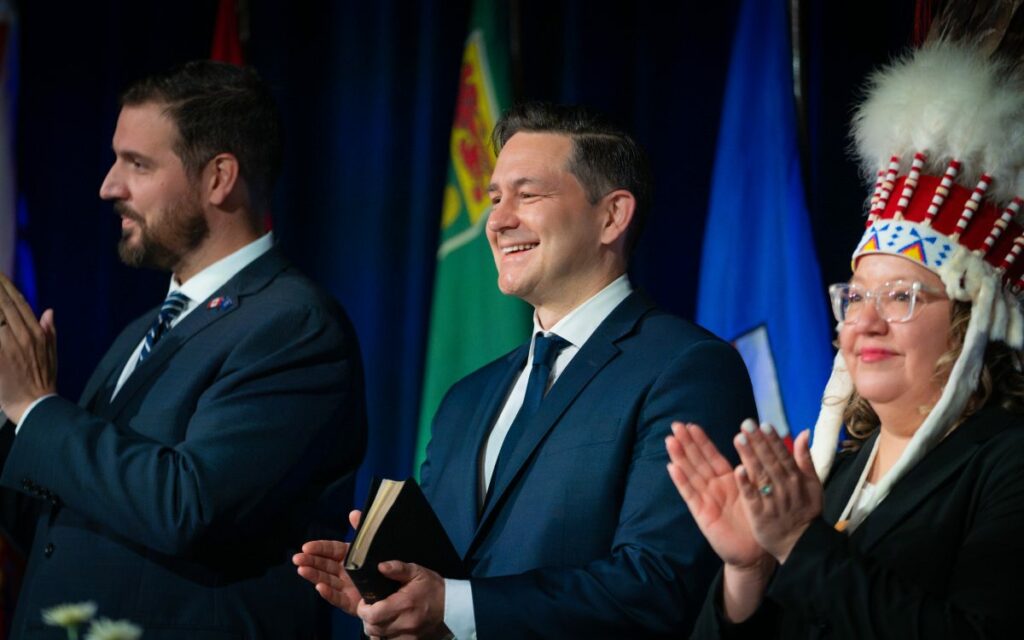
The biggest threat to the Conservatives could be hubris. Assuming victory too early can lead to fatal missteps. Pictured: Conservative Leader Pierre Poilievre. Photo Credit: Pierre Poilievre/X.
Rideau Cottage has been a quiet place this past week. The sunny ways are over, and Prime Minister Justin Trudeau has been pondering not only if he should leave but whether anyone will force his hand. The by-election loss in the Liberal strong hard of Toronto-St. Paul’s, a riding that the Grits have for held since 1993, has sent shockwaves throughout the Liberal Party.
Conservative Party leader Pierre Poilievre is not wasting no time in capitalizing on the momentum. He has launched a campaign-style summer tour, starting with several strategic stops in Quebec. The tour kicked off with a rally in Montreal where Poilievre was met by hundreds of supporters.
A recent Abacus Data poll found that Canadians are already anticipating a Liberal loss in the next election, with half of the respondents believing the Conservatives will emerge victorious. This sentiment is unprecedented, especially given that we are still 16 months out from the anticipated election date. Neither the 2021 nor the 2019 pre-election periods showed anything remotely similar.
For the Conservatives, this summer is crucial. They must keep up the pressure on the government while strategically positioning themselves as the clear choice to form the next government. But how do they do this, and will they lose momentum before the final ballet is cast?
Poilievre’s summer tour is a step in the right direction. By visiting key battlegrounds like Quebec, he is directly challenging traditional Liberal territories. The introduction of strong candidates like Neil Oberman in Mount Royal, another Liberal stronghold, is essential. The Conservatives need to replicate this strategy across the country, identifying and supporting candidates who can win in ridings previously considered unwinnable.
The Liberals are on the defensive, grappling with internal discord and public dissatisfaction. The by-election loss in Toronto-St. Paul’s underscores this vulnerability. It is essential for the Conservatives to consistently highlight the government’s weaknesses, particularly regarding economic matters and tax policies. Emphasizing the challenges that many Canadians are facing caused by government tax initiatives that can resonate with voters feeling the financial pinch.
Although the Conservatives would prefer to run against Justin Trudeau, the recent by-election results might prompt a leadership change within the Liberal Party. The Conservatives must have contingency plans ready for this scenario. Whether it’s Deputy Prime Minister Chrystia Freeland or another Liberal heavyweight stepping up, the Conservatives need to be prepared to pivot their strategy accordingly.
Interestingly, the Conservatives are making inroads into traditional NDP enclaves like labour unions. Publicly, the NDP seems to lack a robust counterstrategy. Leader Jagmeet Singh, despite his personal appeal, is not gaining the traction needed to challenge the Conservatives effectively. Poilievre should continue this outreach, offering policies that resonate with working-class voters and presenting the Conservative Party as a viable alternative to the NDP.
The biggest threat to the Conservatives could be hubris. Assuming victory too early can lead to fatal missteps. They need to remain vigilant, continuously engaging with voters and refining their strategies. This means staying on the offensive while also being responsive to changing political dynamics.
This summer is key for the Conservatives as they ramp up for what will likely be a long and hard-fought election next year. The stakes are high, and the road ahead is challenging, but with focus and relentless effort, Pierre Poilievre and his team can finally bring it home and turn this summer into the foundation of their future success.

Daniel Perry is the Director of Federal Affairs at the Council of Canadian Innovators, leading national advocacy and engagement efforts. With experience in consulting and roles at the Senate of Canada, Queen’s Park, and the Canadian Criminal Justice Association, Daniel has helped political leaders and clients across various sectors achieve their public policy goals. A frequent media contributor and seasoned campaigner, Daniel holds a Master of Political Management from Carleton University.






